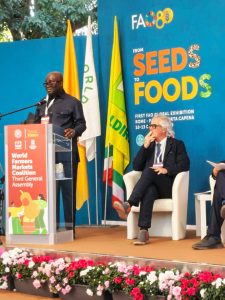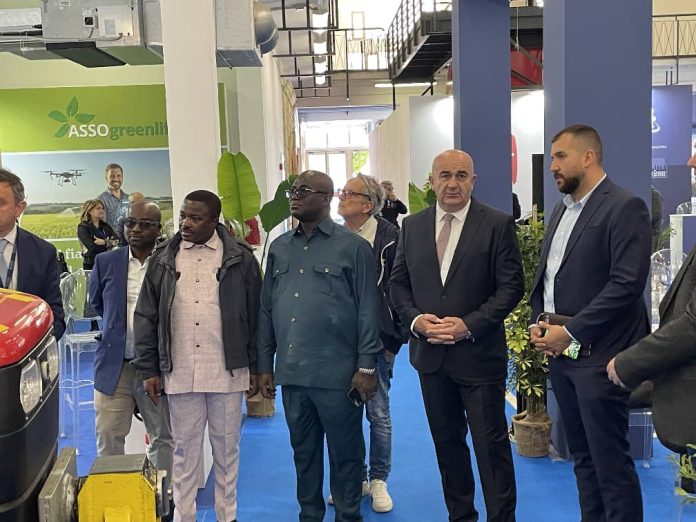Mr Eric Opoku, Minister for Food and Agriculture, has stressed the vital role smallholder farmers play in global food production and called for greater recognition and support for them and other producers along the agricultural value chain.
Addressing the Third General Assembly of the World Farmers Markets Coalition (WorldFMC) in Rome, Italy recently, the Minister noted that these farmers, who are the originators of food, have long been neglected despite their important role in sustaining global food systems.
“Unfortunately, along the value chain, it is the producer who has been neglected all this while. That is why I consider this platform to be extremely important, it recognises the farmer, the person who goes to the field, tills the land, plants the seed, rear livestock and produces the food that sustains us all,” Mr Eric Opoku told his global audience.
He revealed that about 80 percent of Ghana’s farming population consists of smallholder farmers, who dominate the nation’s agricultural landscape and produce the bulk of food consumed domestically.
To empower these farmers and improve the efficiency of the food system, the Ministry of Food and Agriculture has supported the formation of community commodity-based cooperatives across the country.
“Currently, we have successfully established over 70,000 farmer cooperatives nationwide. By organising themselves into cooperatives, our farmers are better positioned to access resources, markets, credit and knowledge that enhance productivity and incomes,” the minister said.

The Third General Assembly of the World Farmers Markets Coalition brought together farmers, market managers, associations and stakeholders from across the globe to share knowledge, evaluate progress and discuss strategies for strengthening farmers markets.
The gathering also focused on issues of biodiversity, food sovereignty, climate resilience and sustainable local supply chains.
Special highlights of the assembly included a biodiversity exhibition, the presentation of a Youth Manifesto for Local Food and the WorldFMC Awards, which recognised outstanding contributions to farmers, markets and local food systems.
In a related development, Ghana has secured €154 million financing agreement from the Italian government under the project titled – “Strengthening Agri-Food Ecosystems in Ghana” – to boost food security and modernise the country’s agricultural value chain.
The project, operating under AID 013210, is a three-year initiative beginning in 2025 and ending in 2027.
It seeks to improve food security and strengthen resilience to climate change through investments and public-private partnerships between Ghanaian and Italian agricultural institutions and private sector actors.
Under the project, 10,000 hectares of land will be developed into a model farm for the production of maize, rice, tomato, and soya.
The farm will operate under full-year irrigation to ensure continuous production, with all produce targeted at supplying the domestic market.
An Italian organisation, the International Centre for Advanced Mediterranean Agronomic
Studies (CIHEAM), will collaborate with Ghana’s Council for Scientific and Industrial Research (CSIR) to produce a soil testing and crop suitability chart to guide production and improve efficiency.
Additionally, CIHEAM will work with the West Africa Centre for Crop Improvement (WACCI) of the University of Ghana to establish a national seed bank.
Beyond agricultural production, the project includes significant social infrastructure development, with the construction of schools, toilet facilities, social centers and ICT hubs for communities in the project area.
The general objective of the initiative is to improve food security and build climate-resilient local food systems aligned with the Sustainable Development Goals (SDGs).
The specific objective focuses on developing and strengthening agri-food value chains, agricultural and civil infrastructure, and the capacities of institutions and local communities through targeted investments and partnerships.
The project is expected to deliver the following outcomes: 10,000 hectares of irrigated farmland cultivated and sustainably managed; Construction of social and community facilities to improve rural livelihoods; Enhanced institutional and technical capacity in modern farming systems and governance.
The direct beneficiaries include workers and staff of the model farm, soil analysts, seed bank agents, farmers’ associations, Ministry of Food and Agriculture officials, and young agricultural entrepreneurs.
The indirect beneficiaries will be residents of the Aveyime-Battor rural area, approximately 23,000 people and the wider Volta Region, home to over 1.6 million people, who will benefit from the project’s ripple effects and scalability.
Minister Eric Opoku’s participation at the Eighth Agrilevante Fair in Bari, Italy, from October 7 to11, 2025 formed part of this broader collaboration with the Italian private sector aimed at transforming Ghana’s agri-food system into a more productive, inclusive and sustainable sector.
Follow the The Chronicle Newspaper channel on WhatsApp: https://whatsapp.com/channel/0029VbBSs55E50UqNPvSOm2z








